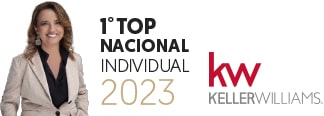
Since January 2022, I have maintained the 1st place in the Keller Williams Portugal National Individual Top, in terms of accumulated business volume, among more than 3,000 KW Portugal consultants.
The year 2022 was positive for the real estate sector, despite the war in Ukraine and inflation, which were added to two years of pandemic and brought new difficulties and challenges. However, the sector has become accustomed to dealing with this reality. Nothing is easy, and everything is achieved with determination and hard work.
The increase in interest rates and inflation have put significant pressure on the construction of new homes and the renovation of used properties. The rise in construction material costs and financial charges associated with loans have contributed to this situation. The sale prices of new homes, marketed as projects, are already incorporating these increases, and inflation is not expected to stabilize or decrease in the near future, particularly due to the continuous economic embargoes imposed on Russia. Materials such as steel, concrete, glass, and wood have been the most affected by the price escalation.
Inflation of these and other components has led to successive upward revisions since August 2021, prompting many real estate developers to postpone the launch of new construction projects or adjust sale prices according to increased costs. This scenario creates an environment of uncertainty and contraction in the real estate sector, negatively impacting the pace of development of new ventures.
Regarding the market for used properties in the greater metropolitan area of Lisbon, during 2022, it is estimated that there has been a reduction of approximately 40% in the number of houses put up for sale compared to the year before the pandemic (2019). This decrease is also influenced by the restrictions imposed on the local accommodation sector, which has limited the supply of used homes available in the market. Furthermore, pandemic containment measures and economic instability have worsened the situation, contributing to the contraction of the real estate market.
The impact of rising interest rates on housing loans is already being felt, with the Euribor rate continuing its upward trajectory at 3.5%, heading towards 4%, in anticipation of the expected increase in ECB benchmark rates to new highs not seen since 2015.
In summary, rising interest rates, inflation, and embargoes on Russia have significantly impacted the construction sector and the used property market, affecting both the supply of new housing and the availability of used homes for sale, especially in the metropolitan area of Lisbon.
However, despite these less positive news, not everything is bleak. The real estate market continues to receive positive indications, both in the number of transactions and the interest shown by foreign buyers and expatriates.
Portugal remains a safe country for those seeking a place away from war, but within the European space, and real estate investment is even safer given the anticipated losses in other economic sectors.
I am very grateful for this award and confident about the future!


